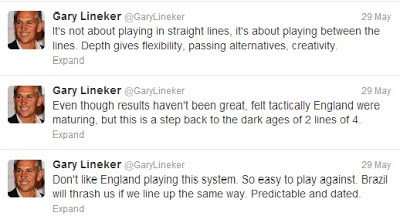Thousands of retweets and replies, questions immediately put to the England manager, hundreds of news articles.
In fact it took Gary Lineker more than a tweet to express his dismay at England’s performance on Wednesday night.
Just three tweets though. 415 characters:
Don't like England playing this system. So easy to play against. Brazil will thrash us if we line up the same way. Predictable and dated.
Even though results haven't been great, felt tactically England were maturing, but this is a step back to the dark ages of 2 lines of 4.
It's not about playing in straight lines, it's about playing between the lines. Depth gives flexibility, passing alternatives, creativity.
But the domestic season is done and dusted and column inches still need filled, even after a dullard friendly. So Angry Gary, 52, from Leicester, made headlines.
That Roy Hodgson, his blazingly red proboscis perhaps hinting at sunstroke, cited largely unseen comparisons to Borussia Dortmund and then asked for a definition of "dark ages" prolonged the teacup’s localised storm.
Silly season. All good fun for the detached observer.
The real shock was that this was maybe the most extensive punditry I’ve witnessed from the usually conscientiously mild Lineker all season.
Even previous Twitter "spats" have involved broadcasting rivals and Joey Barton rather than a discourse on tactics.
Amid the cloying cosiness of the Match of the Day studio, Lineker the ringmaster lets his mates get away with it, even now apparently too mindful of his switch to presenter to challenge Al, Alan or Lawro with any insight of his own.
His verdict on England might not have been the most incisive dismantling of an England performance but it tops almost anything Alan Shearer can offer about a Premier League game.
Maybe Lineker is one of those "typical twitterers" we used to hear about, sitting in his underpants being brave behind a keyboard only to revert to inoffensive conformity when he leaves the house, hawking anodyne puns and bags of crisps, existing in a state of constant complacency brought on by not being Adrian Chiles.
Saying not a lot and always looking a bit too confident of his place in the affections of the nation, little more than a Walkers branded Queen Mum.
No longer. Something finally snapped on Wednesday evening.
Alan Shearer thinking that simply being Alan Shearer is enough will no longer be tolerated. Alan Hansen thinking that simply being a parody of Alan Hansen is enough won’t wash anymore. Mark Lawrenson thinking that he just about knows where on earth he is just won’t cut it.
From next season there’s a new Lineker in the studio, a new mantra for Match of the Day:
"It's not about playing in straight lines, it's about playing between the lines. Depth gives flexibility, passing alternatives, creativity."
The mouse has roared.
